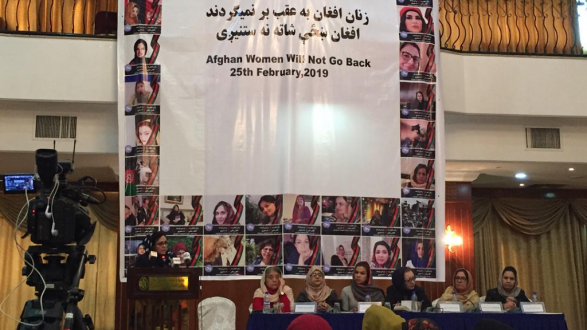In a March 5 State Department press briefing, deputy spokesperson Robert Palladino included the following in his opening remarks:
“I am very pleased to announce that on March 7, Secretary of State Pompeo will host the International Women of Courage Awards. The awards demonstrate the United States’ commitment to gender equality, social inclusion, and advancing the global status of women and girls from all backgrounds across sectors as part of our foreign policy. The United States firmly believes the global prosperity, security, and stability is not achievable without the full economic, social, and political participation of women and girls.”
However, many women in Afghanistan would say otherwise due to the lack of women’s participation in the ongoing peace talks between the U.S. government and the Taliban, which kicked off in the Qatari capital, Doha, in January of this year.
Thousands of women and young people in Afghanistan, as well as Afghans living abroad, have been protesting and speaking out against the negotiations not including women’s voices and women’s rights as a primary issue.
NPR reports thousands of women and young people in Afghanistan, as well as Afghans living abroad, have been protesting and speaking out against the negotiations not including women’s voices and women’s rights as a primary issue.
According to NPR, activists say that the views of the Taliban—whose harsh rule from 1996 to 2001 was notorious for repression of women—do not reflect the views and needs of Afghan people. They fear a Taliban return to power will undermine the progress that the country has worked to build since the regime fell nearly two decades ago.
In February, a group called Afghan Women for Peace, the office of Afghan first lady Rula Ghani, and other civil society groups brought together over 3,500 Afghan women from the country’s 34 provinces in a Jirga, or tribal council, to discuss concerns and suggestions for the peace process.
With a return to Taliban rule, Afghan women fear that they would lose their constitutional rights to health care and education and that their daily existence and future progress would suffer as well.
While this Jirga did not receive a lot of international media attention, photos and statements from the meeting were shared on Twitter with the hashtag #AfghanWomenWillNotGoBack. While Afghan women still face numerous hardships and discrimination, the country has made significant gains in the past decade, including a constitution that provides some protection of women’s rights.
Since the Taliban lost full power in 2001, women actively participate in government, education, entrepreneurship, and more. But with a return to Taliban rule, Afghan women fear that they would lose their constitutional rights to health care and education and that their daily existence and future progress would suffer as well.
While Afghan women demand that their rights must be non-negotiable and remain enshrined in the Afghan constitution, this is not listed as one of the four primary issues of the peace talks between the U.S. government and the Taliban. When asked about the United States negotiating with the Taliban, Palladino said, “These discussions are ongoing, and what they’re focusing on are the four interconnected issues that are going to compose any future agreement, and those four are counterterrorism, troop withdrawal, intra-Afghan dialogue, and a ceasefire.”
If the United States wants to withdraw from Afghanistan and have a chance of a true, lasting peace, representatives of the U.S. government must place women’s rights and women’s voices at the forefront.
A reporter followed up with the question, “Does the United States also have concern about the future of women in Afghanistan with these ongoing talks with the Taliban, and if the Taliban returns to government in Afghanistan?”
Palladino responded, “We’re going to continue to support a peace process that aims to address the legitimate concerns of the Afghan people and sustains the social and economic gains of the last 17 years, and that means ensures a better future for all Afghans, particularly women and youth.” But this verbal assurance means little to the Afghan women who lived under Taliban rule and who currently have no voice at the negotiating table.
If the United States wants to withdraw from Afghanistan and have a chance of a true, lasting peace, Palladino and other representatives of the U.S. government, including Special Representative Zalmay Khalilzad who is leading the U.S. team during the peace talks, must place women’s rights and women’s voices at the forefront.
If the United States wants to implement effective foreign policy and foster legitimate peace negotiations, women need a seat at the table.
According to UN Women’s figures on peace and security, women’s participation in peace negotiations increases the durability and the quality of peace. Additionally, this UN Women study shows peace agreements signed by female delegates demonstrate higher implementation rate for agreement provisions.
Under Taliban rule, Afghan women were not allowed to go to school or leave their house without a male guardian. Such restrictions not only hinder women, but the stability of a country as well. Women with freedom of mobility, access to education, and basic rights contribute to economic growth and reduce poverty levels, which are key factors of maintaining peace and stability in post-conflict regions.
The ongoing peace talks between the U.S. government and Taliban are the highest level of negotiations since the start of the war 18 years ago, and both sides are reporting gradual progress and meaningful discussion. However, lasting peace and progress cannot be sustained without representation of the women who are active on the ground and make up nearly half of the country’s population. If the United States wants to implement effective foreign policy and foster legitimate peace negotiations, women need a seat at the table.
_______________________
Gemma Stewart is the Spring 2019 Communications Junior Fellow at the Pacific Council on International Policy.
The views and opinions expressed here are those of the author and do not necessarily reflect the official policy or position of the Pacific Council.




